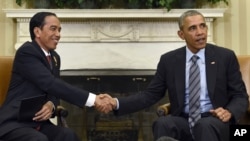ສະຫະລັດ ແລະ ອິນໂດເນເຊຍ ໄດ້ຕົກລົງກັນ ທີ່ຈະຂະຫຍາຍ
ການຮວມມື ແບບລົງເລິກ ຫລັງຈາກການສົນທະນາກັນທີ່ທຳ
ນຽບຂາວກ່າວວ່າ ເປັນພາກສ່ວນໃນຄວາມພະຍາຍາມ ເພື່ອ
ສ້າງຄວາມກໍ້າເກິ່ງໄປສູ່ຂົງເຂດເອເຊຍປາຊິຟິກ. ປະທານາທິ
ບໍດີ Barack Obama ໄດ້ພົບປະກັບ ປະທານາທິບໍດີອິນໂດ
ເນເຊຍ ທ່ານ Joko Widodo ໃນວັນຈັນວານນີ້.
ຫົວຂໍ້ຂອງການຫາລື ແມ່ນຮວມທັງການປ່ຽນແປງຂອງດິນຟ້າອາກາດ ຄວາມ ໝັ້ນຄົງ
ການຄ້າ ການກໍ່ການຮ້າຍ ແລະການຮວມມືທາງທະເລ.
ຫລັງຈາກການພົບປະກັນ ທ່ານ Obama ຮ້ອງອິນໂດເນເຊຍວ່າເປັນ “ພາຄີ ດ້ານຍຸດ
ທະສາດທີ່ສຳຄັນ” ຢູ່ໃນຂົງເຂດ. ທ່ານໄດ້ໃຫ້ຂໍ້ສັງເກດວ່າ ເປັປະເທດ ປະຊາທິປະໄຕ ທີ່
ໃຫຍ່ທີ່ສຸດປະເທດນຶ່ງໃນໂລກ ທີ່ມີປະຊາກອນປະມານ 250 ລ້ານຄົນ ເປັນປະເທດມຸສ
ລິມ ຊຶ່ງແຕ່ໃດໆມາແມ່ນນິຍົມແນວທາງປານກາງ ແລະ ມີການອະນຸໂລມຜ່ອນຜັນ ບົດ
ບາດຂອງການເປັນຜູ້ນຳຢູ່ນຳຢູ່ໃນຂົງເຂດ ແລະ ບົດບາດທາງດ້ານການຄ້າ ການພານິດ
ແລະ ການພັດທະນາດ້ານເສດຖະກິດ ຂອງຈາກາຕ້າ.
ປະທານາທິບໍດີອິນໂດເນເຊຍທີ່ມັກໃຫ້ຮ້ອງວ່າ Jokowi ນັ້ນ ກ່າວວ່າ ປະເທດຂອງທ່ານ
ແມ່ນ “ເສດຖະກິດທີ່ເປີດກວ້າງ. ພວກເຮົາເປັນປະເທດເສດຖະກິດ ທີ່ໃຫຍ່ສຸດໃນເອເຊຍ
ຕາເວັນອອກສຽງໃຕ້ ທ່ານກ່າວອີກວ່າ “ອິນໂດເນເຊຍ ມີຄວາມຕັ້ງໃຈທີ່ຈະເຂົ້າຮວມຂໍ້
ຕົກລົງພາຄີຂ້າມມະຫາສະມຸດປາຊິຟິກຫລື TPP.
ອິນໂດເນເຊຍ ແມ່ນປະກອບເປັນເຄິ່ງໜຶ່ງຂອງເສດຖະກິດ ໃນເຂດເອເຊຍຕາເວັນອອກ
ສຽງໃຕ້ ແຕ່ທ່ານ Murray Heibert ທີ່ສູນກາງຍຸດທະສາດ ແລະການສຶກສານາໆຊາດ
ກ່າວວ່າ ປະເທດດັ່ງກ່າວ ເປັນປະເທດທີ່ປົກປ້ອງອຸດສາ ຫະກຳພາຍໃນປະເທດສູງຫຼາຍ.
ທ່ານກ່າວວ່າ “ລະດັບການຄ້າ ກັບສະຫະລັດ ແມ່ນຢູ່ໃນລະດັບດຽວກັນກັບປະເທດ
Honduras ແລະ ບາງປະເທດໃນອາເມຮິກາກາງ. ມີປະຊາກອນ 250 ລ້ານຄົນ. ແຕ່
ນັ້ນເປັນການຄ້າທີ່ນ້ອຍແລະໜ້າສັງເວດ.”
ເຖິງແມ່ນວ່າ ທ່ານ Jokowi ໄດ້ສະແດງຄວາມສົນໃຈການເຂົ້າຮ່ວມ ຂໍ້ຕົກລົງພາຄີຂ້າມ
ມະຫາສະມຸດປາຊິຟິກກໍຕາມ ແຕ່ທ່ານຍັງປະເຊິນໜ້າກັບການຄັດຄ້ານຢ່າງແຂງຂັນ ຢູ່ທີ່
ປະເທດຂອງທ່ານ.
It is possible but not yet confirmed that Japanese Prime Minister Shinzo Abe and South Korean President Park Geun-hye will meet November 2nd during the first trilateral summit of leaders from China, Japan and South Korea to be held since 2012.
The South Korean presidential office announced the proposed bilateral Monday.Abe will be in Seoul Nov. 1st and 2nd for the trilateral but has not yet responded to Park's request to hold a one-on-one meeting with her on the summit sidelines.
One Japanese newspaper suggested that Tokyo and Seoul are still negotiating over how to handle the contentious "comfort women" issue.
President Park, who took office in 2013, had until now refused to hold a formal meeting with Prime Minister Abe until he offered a "sincere apology" and compensation to the thousands of Asian "comfort women" forced into prostitution by Japan's military during its colonization of much of Asia until the end of World War II.
Abe's Japanese nationalist supporters have stirred public protests in South Korea and China by suggesting many of the women were not forced but voluntarily worked in military brothels for financial gain.
But in August Park indicated she would overlook Abe's omissions and focus instead on his promise to uphold past Japanese apologies including the 1993 Kono Statement that offered apologies and remorse to comfort women.
Trilateral planning continues
China will be represented at the summit by Premier Li Keqiang who will be in Seoul Oct. 31st to Nov. 2nd. No explanation was given as to why the heads of state from Japan and South Korea will meet with Premier Li and not with Chinese head of state President Xi Jinping.
In 2008 the three major Northeast Asian leaders began to meet on an annual basis but after 2012 the summits were suspended because of intensifying territorial disputes.
China and Japan hold conflicting claims to uninhabited islands in the East China Sea, called the Senkakus in Japan and the Diaoyu in China.
Japan and South Korea have their own ongoing dispute over two islets, called Takeshima in Japan and Dokdo in South Korea.
However Japan's seeming unrepentant attitude under Abe over its wartime past has intensified regional resentment and anger against Tokyo.
Chinese Foreign Ministry spokeswoman Hua Chunying said Monday that this issue will be addressed at the summit.
"We hope each side can properly handle the historical issues by facing up to history squarely and working together for the future," said Hua.
Regional security
Japan analyst Hosaka Yuji, a political science professor at Sejong University does not expect any further concessions from Abe on this issue.Instead he says Park has decided it is time to move on to more pressing concerns.
"It is not appropriate nor in South Korea's national interest to stop working on other diplomatic issues to focus exclusively on the comfort women issue," Hosaka said.
Washington has been urging its two major military allies in Asia to reconcile so as to improve regional security coordination.
Japan strongly supports U.S. efforts to protect freedom of navigation in the Pacific and to counter China's aggressive claims on the South China Sea.
The U.S. Navy Tuesday sent a warship within 12 nautical miles of artificial islands built by China in the South China Sea.
South Korea however has been reluctant to criticize China so as to maintain Beijing's support for sanctions against Pyongyang.
North Korea nuclear threat
Seoul and Tokyo both support Washington's position that Pyongyang must first halt its nuclear development program before any new international talks to ease sanctions and increase economic assistance can begin.
Beijing however may support more positive outreach given Pyongyang's recent good behavior and restraint in holding off on missile and nuclear tests.
"In order to resolve the North Korea issue, China may have a strategy to put brakes on South Korea, the United States and Japan." Hosaka said.
South Korea and China have also voiced concerns over Japan's recent security legislation, which authorizes the military to protect japanese interests and assist its ally Washington in times of crisis.Seoul wants to clarify that Tokyo still needs its permission to enter Korean territory.
The U.S. led Trans Pacific Partnership (TPP) agreement will also likely be discussed. Japan is one of the 12 member countries of the regional free trade agreement that would cover 40% of world trade.
South Korea has expressed interest in joining the TPP.China is not part of the pact and the TPP is seen by some as a way to counter China's growing economic power.
((ends))






